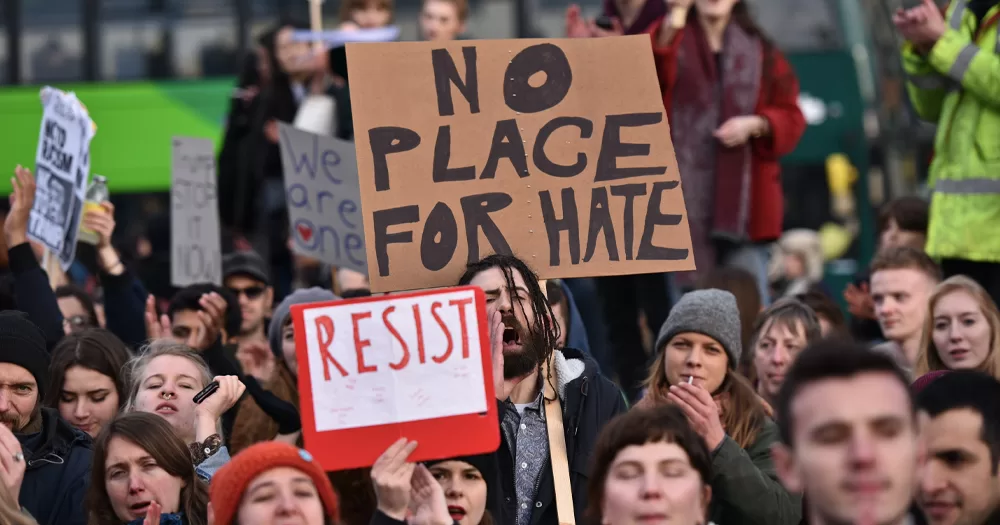According to reports, the Incitement to Violence or Hatred and Hate Offences Bill 2022 will not move to its next stage on the legislative process until September this year. Despite the recent increase in violence against LGBTQ+ people and other minorities, Ireland remains one of the few European countries that does not have an appropriate hate crime law.
First published on October 27 last year, the Incitement to Violence or Hatred and Hate Offences Bill 2022 faced a recess and then passed its final stage in the Dáil earlier in April. It then moved to the Seanad, where it passed the second stage in June. However, as reported by The Journal, it is understood that the hate crime law won’t move to Committee Stage until September 2023 at the earliest.
If made into law, the bill will introduce “aggravated” versions of existing criminal offences in cases in which such offences are motivated by hatred against a victim’s “protected characteristics”. In addition, it will expand the existing hate speech legislation, making communication or behaviour that is likely to incite hatred a criminal offence, with a penalty of up to five years in prison.
The bill is fully LGBTQ+ inclusive, with the list of protected characteristics including race; colour; nationality; religion; national or ethnic origin; descent; gender (also entailing gender identity); sex characteristics; sexual orientation; and disability.
Activists have repeatedly highlighted the importance of such legislation in the protection of minority groups in Ireland, especially considering the increase in hate crimes and hate-related incidents recorded by An Garda Síochána in the last year.
However, during the Seanad debate in June, some senators raised concerns about the “vagueness” of the bill, with Independent Senator Michael McDowell saying that such legislation will have a “chilling effect” on free speech because “most people will take many many steps to avoid the danger of being prosecuted and shut their mouths”.
Minister for Justice Helen McEntee replied to this line of questioning by saying that Ireland already has a hate speech law, the Prohibition of Incitement to Hatred Act 1989, and that the new bill is an updated version of such outdated legislation.
Nevertheless, it is understood that a number of senators supposedly requested a meeting with Minister McEntee to discuss further concerns about the bill. Government sources have specified that this is not the reason why the law won’t progress until after the summer, but activists are calling on legislators to ensure this law is passed withing the year.
Pádraig Rice, Policy and Research Manager at LGBT Ireland, commented on the news, saying: “Senators who oppose hate crime legislation can’t be allowed to unduly delay this bill. There was a 30% rise in reported hate crimes last year.
“The new hate crime law must be put in place to protect affected communities, including the LGBTQI+ community. We want to see this bill passed, enacted, and enforced by the end of the year at the very latest.
“Beyond the bill, we want to see measures put in place to prevent hate crimes. We believe this should take the form of an Action Plan Against Hate Crimes,” Rice added.
“This new plan should include targeted education and awareness raising, training for Gardaí, improved monitoring, reporting, and data gathering, and better victim support. There is no reason why work on this plan can’t be started this summer while the Oireachtas is in recess.
“Tackling hate crimes won’t just benefit the LGBTQI+ community. It will also benefit other communities that are targeted in a similar way, including travellers, migrants, asylum seekers, people with disabilities and people of colour. But ultimately, safer streets, less crime, and a more decent public discourse both on and offline will benefit everyone in Ireland,” the activist concluded.
Board Director of the National LGBT Federation (NXF), Adam Long also stated: “Our priority has always been to see this much needed and long overdue legislation enacted before the end of the year and we have received assurances from the Taoiseach and senior Government Ministers that they are determined to deliver on that timeline.”
“We are also clear that key provisions of the Bill, such as the ‘Demonstration Test’, must be retained in order to make the law effective and victim-centred – a position shared by a clear majority of the civil society groups who are members of the ‘Coalition Against Hate Crime’,” Long explained.
“An inclusive definition of gender is also hugely important and we must not allow disinformation and contrived culture war narratives to undermine vitally needed protections at a time when we are seeing a disturbing rise in hate offences and the emboldening of hate, particularly in the online space,” he said.
© 2023 GCN (Gay Community News). All rights reserved.
Support GCN
GCN is a free, vital resource for Ireland’s LGBTQ+ community since 1988.
GCN is a trading name of National LGBT Federation CLG, a registered charity - Charity Number: 20034580.
GCN relies on the generous support of the community and allies to sustain the crucial work that we do. Producing GCN is costly, and, in an industry which has been hugely impacted by rising costs, we need your support to help sustain and grow this vital resource.
Supporting GCN for as little as €1.99 per month will help us continue our work as Ireland’s free, independent LGBTQ+ media.
